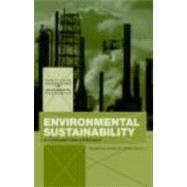- ISBN: 9780415363464 | 0415363462
- Cover: Hardcover
- Copyright: 8/2/2006
With globalization fast becoming an irreversible process, it is necessary to pay increased attention to the implications for environmental sustainability. Some commentators have uncritically assumed that globalization would result in all-round prosperity whereas the opposing view holds that in order to sustain growth and consumption, a certain threshold level of per capita income should be attained - the so-called environmental Kuznets curve (EKC) argument. This argument implies that rapid economic growth in many developing countries should be environmentally unsustainable. Environmental Sustainabilityaddresses this dichotomy and articulates a notion of consumption sustainability that is both universal and pertains to the indefinite future. Additionally, it emphasizes the importance of addressing a broad spectrum of sources of environmental degradation and relates this measure to an index of economic achievement more complete than per capita income. The EKC conclusion is examined and isdemonstrated to be untenable, it is argued that there is scope to permit developing countries to target high rates of economic growth and that lowering rich countries' consumption would be consistent with environmental sustainability. Jha and Murthy critique the Environmental Sustainability Index (ESI), which has been proposed as a measure of the overall state of the environment and advance an alternative methodology for computing environmental sustainability. The authors empirically substantiate the proposition that a certain type of development in the presently high-income countries is primarily responsible for global environmental degradation. Several policy conclusions for global environmental management are also advanced.







